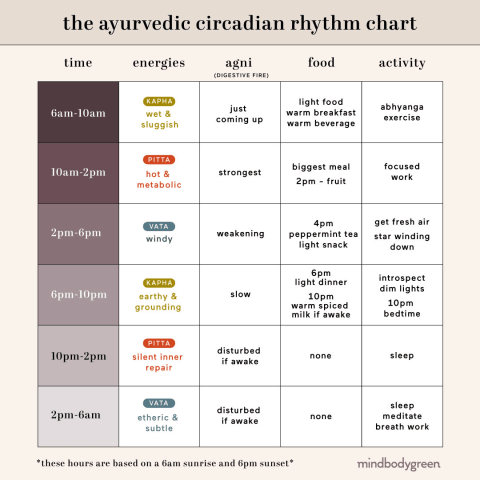Advertisement
The Best Time Of Day To Eat, Sleep & Exercise According To Ayurveda


If you've ever been on a guided animal safari, you may have heard a ranger tell you about the types of animals you're most likely to spot at different times of the day. Most mammals on the planet do not have evolved brains like us humans, yet they have certainly preserved their circadian intelligence.
Ayurvedic science is based on this principle from the ancient Indian text, the Yajur Veda:
"Yatha Brahmande, Tatha Pinde; Yatha Pinde, Tathe Brahmande"
"As is the universe, such is the human body; as is the human body, such is the universe"
This means that the universe outside of us mimics patterns within us and vice versa. By simple examination of the cycles of the sun, we can understand what's happening inside our bodies, and thus, we can determine what activity is best suited for a particular time of the day. In this sense, Ayurveda was talking about the importance of circadian rhythms way before the term "circadian" was coined.
According to Ayurveda, the day is broken into six unique phases suited to specific activities. Here's your guide to each of the time windows and how to optimize them:
6 a.m. to 10 a.m. (The kapha phase of the morning)
The sun is rising, and the earth is barely starting its metabolic activities. Wet with dew, the planet is still cool from the moon's effect.
Similarly, our body and its digestive environment (agni) are damp and sluggish with nasal congestion, eye boogers, and even stiff joints. Therefore, the goal is to warm up the body and get it going.
This makes this the ideal time window for Vyayam, or exercise. Exercising at other times in the day can potentially aggravate vata. But in the morning, it fires up the gut, warms up the joints, and gets all bodily fluids in motion. Abhyanga, or a gentle oil massage, before Vyayam can lower the risk of injury and increase the benefits of exercise.
For breakfast, consume something warm and lightly spiced, like porridge with cinnamon, a spiced malt, or stewed fruit. These will support internal warmth. Cold smoothies and drinks, when consumed in the early morning, further dampen the gut. This may give one the illusion of being satiated as the digestive fire dwindles (agni), but this could potentially hurt the gut's bacteria in the long term.
10 a.m. to 2 p.m. (The pitta time of day)
As the sun reaches its peak, all things get fired up, and daytime metabolic activity is at its highest. This makes people naturally more productive—and also more hungry. With the agni doing its best dance, lunchtime is an opportunity to eat our biggest meals and indulge.
2 p.m. to 6 p.m. (The vata time of day)
As the sun begins its descent, cool and windy energy spreads across the planet. We often yawn and stretch to remove trapped wind (vata), and a bit of crankiness might set in too.
The desire to stay focused longer makes caffeine appealing. But the Ayurvedic recommendation is to get some fresh air, take a few long deep breaths, and drink stimulating peppermint or tulsi tea. You'll also want to reserve this time for tasks that take less focus so you can begin winding down.
6 p.m. to 10 p.m. (The kapha time of the night)
As the sun gradually disappears beyond the horizon, so does our agni. Before the invention of the light bulb, humans naturally ate their last meals before sunset.
With this in mind, dinner should be early and the lightest and simplest meal of the day. This practice honors the evening agni, leaves plenty of hours for digestion before bedtime, and maintains the body's natural rhythms.
To help the body relax during this time, you'll also want to dim the lights, slow down your pace, and start to prepare for bedtime.
10 p.m. to 2 a.m. (The pitta time of the night)
Humans are diurnal beings, meaning we are meant to be active during the day and relax at night. Once the sun goes down, our bodies begin getting ready for nightly cellular repair and restoration. It is a time for effortless healing—as long as one is asleep. Being in bed as close to 10 p.m. as possible and prioritizing high-quality sleep with few wakeups allows us to take advantage of this enhanced healing period.
2 a.m. to 6 a.m. (The vata time of night)
The body has finished its cellular repair, digestion is complete, and there is a natural lightness (vata). Suddenly, sleep patterns become light, making it the hardest to fall back asleep if one is awakened during these hours. Not only that, but the newly created space can also allow for anxiousness to set in unless it's given something better to do.
It is best to stay asleep during these hours, but if not, meditating, breath work, and mantra chanting are the most effective to ground the nervous system and utilize morning high-frequency brain wave patterns.
As the clock ticks 6 a.m. again, we return to the morning kapha phase, and the cycle repeats itself.

The takeaway
Modern science is now discovering what Ayurveda has known all along: Certain parts of the body are more active at certain times of the day, supporting specific activities. Working with our innate circadian rhythms means swimming with the tide of the day and preserving energy, thus preserving life.